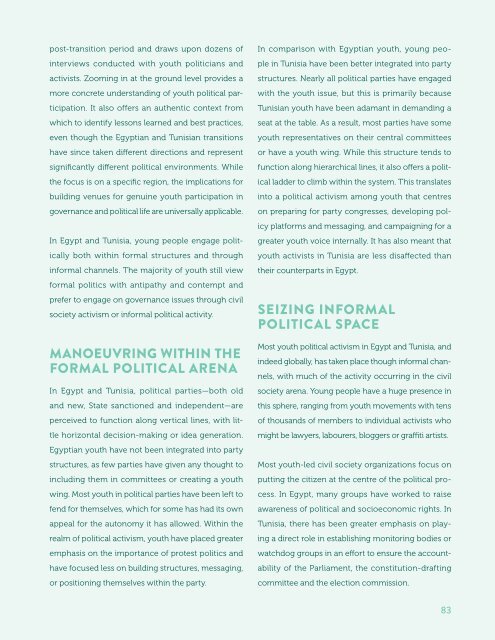YOUTH CIVIC
JieguI2U
JieguI2U
Create successful ePaper yourself
Turn your PDF publications into a flip-book with our unique Google optimized e-Paper software.
post-transition period and draws upon dozens of<br />
interviews conducted with youth politicians and<br />
activists. Zooming in at the ground level provides a<br />
more concrete understanding of youth political participation.<br />
It also offers an authentic context from<br />
which to identify lessons learned and best practices,<br />
even though the Egyptian and Tunisian transitions<br />
have since taken different directions and represent<br />
significantly different political environments. While<br />
the focus is on a specific region, the implications for<br />
building venues for genuine youth participation in<br />
governance and political life are universally applicable.<br />
In Egypt and Tunisia, young people engage politically<br />
both within formal structures and through<br />
informal channels. The majority of youth still view<br />
formal politics with antipathy and contempt and<br />
prefer to engage on governance issues through civil<br />
society activism or informal political activity.<br />
MANOEUVRING WITHIN THE<br />
FORMAL POLITICAL ARENA<br />
In Egypt and Tunisia, political parties—both old<br />
and new, State sanctioned and independent—are<br />
perceived to function along vertical lines, with little<br />
horizontal decision-making or idea generation.<br />
Egyptian youth have not been integrated into party<br />
structures, as few parties have given any thought to<br />
including them in committees or creating a youth<br />
wing. Most youth in political parties have been left to<br />
fend for themselves, which for some has had its own<br />
appeal for the autonomy it has allowed. Within the<br />
realm of political activism, youth have placed greater<br />
emphasis on the importance of protest politics and<br />
have focused less on building structures, messaging,<br />
or positioning themselves within the party.<br />
In comparison with Egyptian youth, young people<br />
in Tunisia have been better integrated into party<br />
structures. Nearly all political parties have engaged<br />
with the youth issue, but this is primarily because<br />
Tunisian youth have been adamant in demanding a<br />
seat at the table. As a result, most parties have some<br />
youth representatives on their central committees<br />
or have a youth wing. While this structure tends to<br />
function along hierarchical lines, it also offers a political<br />
ladder to climb within the system. This translates<br />
into a political activism among youth that centres<br />
on preparing for party congresses, developing policy<br />
platforms and messaging, and campaigning for a<br />
greater youth voice internally. It has also meant that<br />
youth activists in Tunisia are less disaffected than<br />
their counterparts in Egypt.<br />
SEIZING INFORMAL<br />
POLITICAL SPACE<br />
Most youth political activism in Egypt and Tunisia, and<br />
indeed globally, has taken place though informal channels,<br />
with much of the activity occurring in the civil<br />
society arena. Young people have a huge presence in<br />
this sphere, ranging from youth movements with tens<br />
of thousands of members to individual activists who<br />
might be lawyers, labourers, bloggers or graffiti artists.<br />
Most youth-led civil society organizations focus on<br />
putting the citizen at the centre of the political process.<br />
In Egypt, many groups have worked to raise<br />
awareness of political and socioeconomic rights. In<br />
Tunisia, there has been greater emphasis on playing<br />
a direct role in establishing monitoring bodies or<br />
watchdog groups in an effort to ensure the accountability<br />
of the Parliament, the constitution-drafting<br />
committee and the election commission.<br />
83


